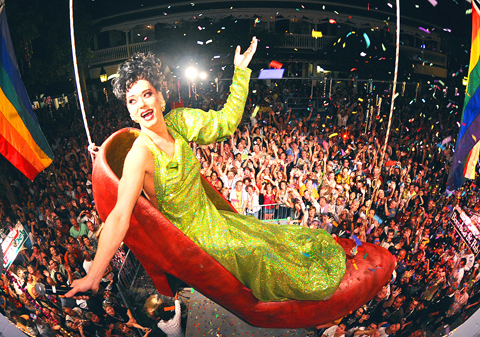New Yorkers greeted the New Year under the protection of snipers in Times Square and millions worldwide shrugged off security fears to usher in 2010 with massive celebrations.
Russians were treated to a surprise cartoon caricaturing Russian President Dmitry Medvedev and Prime Minister Vladimir Putin.
Parties to bid farewell to the “Noughties,” which saw the Sept. 11, 2001, attacks, the wars in Afghanistan and Iraq, and a disastrous economic crisis, brought out millions in the world’s major cities, but strict security measures were taken across the globe after the Christmas Day attempt by a Nigerian suspect to blow up a US airliner bound for Detroit.

PHOTO: AFP
Fireworks burst into the night sky in Auckland, New Zealand, the first major city to see in the New Year.
Australian Police Minister Michael Daley urged revelers to keep a lid on their drinking.
“If you’re one of these fools that can’t handle their grog and likes to go out and ruin other people’s nights, make yourself a New Year’s resolution to grow up and behave yourself, and start practicing that on New Year’s Eve,” he said.
Thousands crammed into Hong Kong’s harbor, where 9,000 fireworks were unleashed from the city’s tallest skyscraper and other buildings.
Such spectacles, however, were banned in Thailand, after fireworks caused a New Year’s Eve blaze at a Bangkok nightclub a year ago, killing 65 people.
Huge parties were held at iconic European sites, including the Eiffel Tower in Paris.
Scores of cars were burnt in French cities, but authorities said the number was lower than the hundreds witnessed a year ago.
Russians gathered on Moscow’s Red Square to toast 2010 and were later treated to a surprise cartoon on state TV gently mocking Medvedev and his strongman prime minister.
Thousands of police officers were deployed in New York City, backed by surveillance cameras, rooftop snipers and devices able to detect radiation or biological agents.
Partygoers in Times Square were not allowed to carry backpacks or alcohol.
“We assume here that New York is the No. 1 terrorist target in America,” city police commissioner Raymond Kelly said.

MORE VISITORS: The Tourism Administration said that it is seeing positive prospects in its efforts to expand the tourism market in North America and Europe Taiwan has been ranked as the cheapest place in the world to travel to this year, based on a list recommended by NerdWallet. The San Francisco-based personal finance company said that Taiwan topped the list of 16 nations it chose for budget travelers because US tourists do not need visas and travelers can easily have a good meal for less than US$10. A bus ride in Taipei costs just under US$0.50, while subway rides start at US$0.60, the firm said, adding that public transportation in Taiwan is easy to navigate. The firm also called Taiwan a “food lover’s paradise,” citing inexpensive breakfast stalls

TRADE: A mandatory declaration of origin for manufactured goods bound for the US is to take effect on May 7 to block China from exploiting Taiwan’s trade channels All products manufactured in Taiwan and exported to the US must include a signed declaration of origin starting on May 7, the Bureau of Foreign Trade announced yesterday. US President Donald Trump on April 2 imposed a 32 percent tariff on imports from Taiwan, but one week later announced a 90-day pause on its implementation. However, a universal 10 percent tariff was immediately applied to most imports from around the world. On April 12, the Trump administration further exempted computers, smartphones and semiconductors from the new tariffs. In response, President William Lai’s (賴清德) administration has introduced a series of countermeasures to support affected

CROSS-STRAIT: The vast majority of Taiwanese support maintaining the ‘status quo,’ while concern is rising about Beijing’s influence operations More than eight out of 10 Taiwanese reject Beijing’s “one country, two systems” framework for cross-strait relations, according to a survey released by the Mainland Affairs Council (MAC) on Thursday. The MAC’s latest quarterly survey found that 84.4 percent of respondents opposed Beijing’s “one country, two systems” formula for handling cross-strait relations — a figure consistent with past polling. Over the past three years, opposition to the framework has remained high, ranging from a low of 83.6 percent in April 2023 to a peak of 89.6 percent in April last year. In the most recent poll, 82.5 percent also rejected China’s

PLUGGING HOLES: The amendments would bring the legislation in line with systems found in other countries such as Japan and the US, Legislator Chen Kuan-ting said Democratic Progressive Party (DPP) Legislator Chen Kuan-ting (陳冠廷) has proposed amending national security legislation amid a spate of espionage cases. Potential gaps in security vetting procedures for personnel with access to sensitive information prompted him to propose the amendments, which would introduce changes to Article 14 of the Classified National Security Information Protection Act (國家機密保護法), Chen said yesterday. The proposal, which aims to enhance interagency vetting procedures and reduce the risk of classified information leaks, would establish a comprehensive security clearance system in Taiwan, he said. The amendment would require character and loyalty checks for civil servants and intelligence personnel prior to